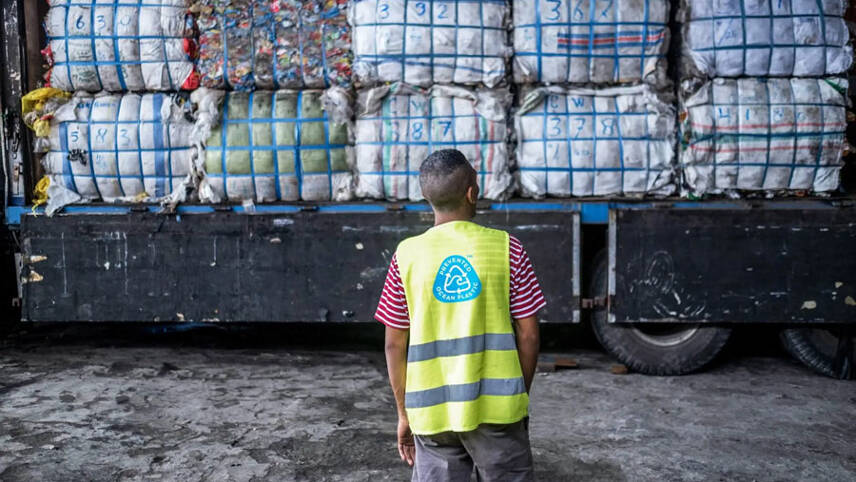Register for free and continue reading
Join our growing army of changemakers and get unlimited access to our premium content

World leaders are finally on the verge of tackling our planet’s plastic problem. But they need to do it fairly. With a global treaty to end plastic pollution due to be agreed by the end of the year, this week we will see the fourth round of negotiations taking place in Canada. This event is often called INC-4.
Central to the debate must be ensuing our transition to a more circular economy is just and inclusive for all waste workers and communities. Otherwise, we risk replacing one problem with another.
Informal waste workers manage 58% of all the plastic waste that’s collected and recovered globally. As the UN Environment Programme has emphasised, we cannot transform our relationship with plastic without them.
At Prevented Ocean Plastic™, we partner with informal waste workers and communities on coastlines acutely impacted by plastic pollution in South-East Asia, the Mediterranean, Central America and South America.
From our work across these regions, we have identified five key recommendations for putting people at the heart of a successful transition to a more circular economy for plastic:
1) Listen to waste workers
The recycling sector can’t afford to ignore its social challenges. The enormity of the world’s waste problem is entwined with rising global inequality. Societies push waste issues out-of-sight, to economically vulnerable places where people’s rights are not prioritised. Waste workers then face social stigmatisation because their jobs are not deemed worthy of dignity and respect.
However, the reality is that waste workers provide an essential service that will play a critical role in building a sustainable, circular economy. With this understanding, the best way forward is to adopt a grassroots approach that centres around informal waste workers. We need to listen to their experiences and opinions to co-create plans of action.
2) Localise programmes
Each programme must not just be tailored both to the geography of a location and to the local people. To remove plastic pollution from a coastal area, it’s necessary to know all about its terrain, urban centres and water bodies – but it’s just as important to understand local customs and culture.
We’ve found that each location presents different structural social challenges. Even within the same country, waste collectors work in diverse environments, each with their own health and safety challenges. A one-size-fits-all approach doesn’t work.
3) Adhere to high universal recycler standards
Although a bespoke approach needs to be adopted for each area, we still need a universal set of rigorous standards for every company or organisation involved in the collection and recycling of ocean-bound plastic. They should ensure, amongst other things, consistent incomes for workers and zero tolerance of child labour.
To this end, we created the Prevented Ocean Plastic Standards, which go beyond basic regulatory and compliance measures to minimise environmental impacts, ensure quality products and improve worker conditions. If all companies can agree on such standards, we can improve the lives of the informal workers at the very far end of supply chains.
4) Underpin the transition with data
Data is everything. It’s essential to creating and operating a programme that successfully gives workers fair pay, decent working conditions and dignity. Discussions with informal waste workers can be formalised into proper research studies. Analysing their demographics is also incredibly useful.
Such data enables us to understand the specifics of the local situation, work out the challenges and, consequently, co-create the best solutions We’re currently supporting ocean-bound plastic expert Jenna Jambeck and the University of Georgia on studies in Tanzania that will provide a snapshot of a community’s circularity, helping to provide data for local, regional, or national decision-making.
5) Forge meaningful partnerships
The ninth UN Sustainable Development Goal relates to building resilient infrastructure, promoting inclusive and sustainable industrialisation and fostering innovation. These aims are are central to the creation of a circular economy, and they are so huge in scope that they are best undertaken by more than one organisation or company. The challenges we face are shared and are ideally addressed collectively. Systemic change requires partnership working.
For example, we’ve partnered with major international organisations, like the US Agency for International Development and investment fund Circulate Capital, to allow us to scale up our efforts. Together we’re building recycling centres in places that have historically lacked waste management infrastructure, to tackle not just plastic pollution but also ensure reliable, fairly-paid work for waste collectors.
As we prepare to leave the era of single-use plastic behind, we are on the brink of the transition to a circular economy. Naturally, the first step is to remove as much plastic as possible from all packaging and swap to more sustainable alternatives. For the unavoidable plastics that remain, the way we collect and recycle them should have people at its heart.
This is our opportunity to start valuing waste collectors as essential workers and upgrade our systems so they’re fair for everyone. In the creation of a better world, we must leave no one behind.
Raffi Schieir is the director of Prevented Ocean Plastic™



Please login or Register to leave a comment.